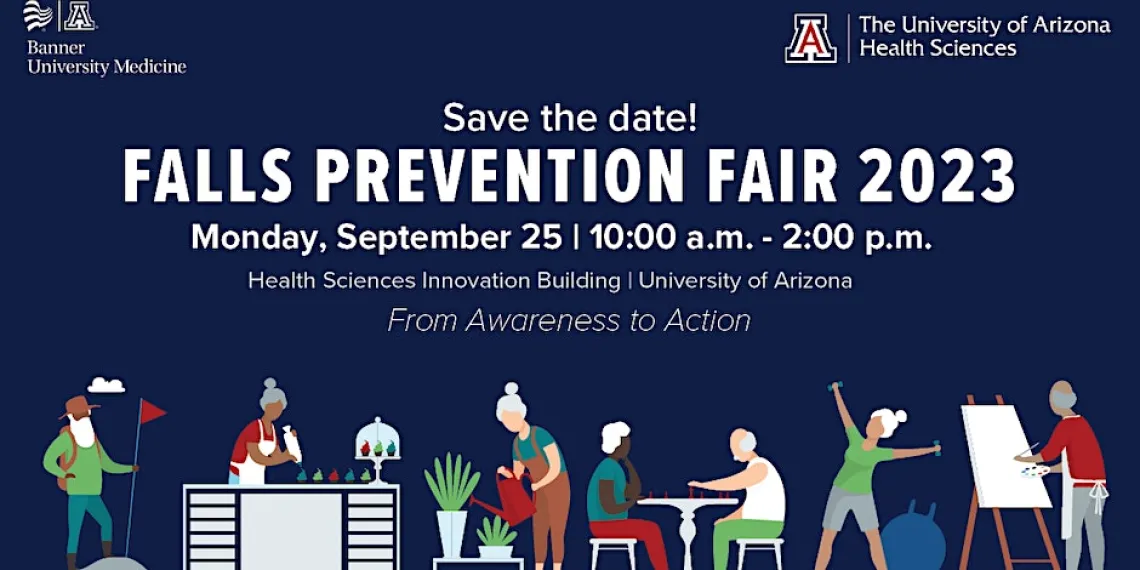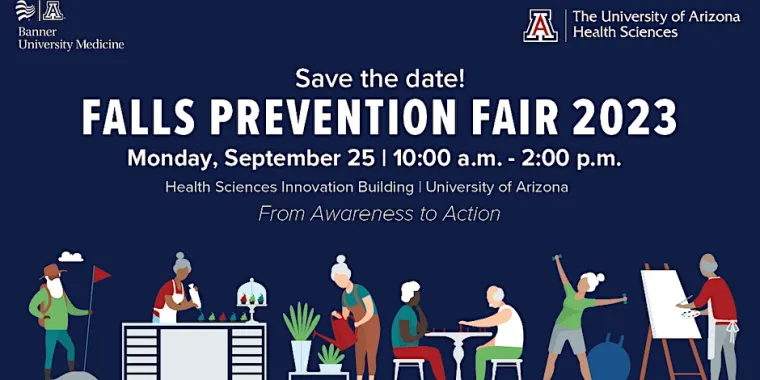Falls Prevention Fair & Awareness Week

The University of Arizona Department of Surgery Division of Trauma, Surgical Critical Care, Burns, and Acute Care Surgery is observing Falls Prevention Awareness Week from September 20-24 to help provide information and resources to the Tucson, Arizona, community that will help older adults live healthy, independent, fall-free lifestyles at the 3rd annual Falls Prevention Fair on September 25, from 10 a.m. - 2 p.m.
Jump To:
- Introduction: Why Do People Fall?
- Falls Prevention Fair
- Arizona Resources
- Six Steps to Prevent a Fall
- Fall Prevention Resources with the National Council on Aging
View and download a PDF version of our Falls Prevention Awareness Guide
Falls Prevention Awareness Week
Falls Prevention Awareness Week, led by the National Council on Aging (NCOA), is an annual nationwide effort to raise awareness that falls are preventable. Here in Tucson, the percentage of adults 65 and over is above the national average and above peer western metros, so education about falls awareness and prevention is particularly important.
One in four older adults fall every year in the U.S., but falling is not a normal part of aging. Adjusting lifestyles and living spaces can help reduce the risk of falling to maintain independence, prevent serious injury, and increase quality of life.
"Falls prevention takes a team of individuals with various expertise," says Dr. Tanya Anand, Geriatric Trauma Director and Assistant Professor of Surgery at the University of Arizona.
She suggests that one easy way to prevent falls is to take stock of your living environment and help make it safe for yourself or for loved ones at risk. Changes such as improving lighting, using assistive devices, and daily physical activity will help reduce the likelihood of a fall.
The NCOA recommends six steps to prevent a fall:
- Find a good balance and exercise program
- Talk to your health care provider
- Regularly review your medications with your doctor or pharmacist
- Get your vision and hearing checked annually and update your eyeglasses
- Keep your home safe
- Talk to your family members
Each of these plays a vital role in falls prevention. Older adults may be weary of exercising at home due to safety concerns, but research has shown that exercising at home is actually not riskier than in a group setting.
Find your nearest local community-based exercise program, such as Matter of Balance or Tai Chi, that will improve balance, as well as daily walking or enrolling in another group exercise program, Dr. Anand suggests. This year, you can take both of these classes at the 2023 Falls Prevention Fair. Register now, because space is limited.
Here in Tucson, the Southern Chapter of the Arizona Falls Prevention Coalition (SCAZFPC) is a local partnership of groups including the Pima Council on Aging, the Pima County Health Department, and the University of Arizona, that promote strategies to prevent falls and fall-related injuries among older adults.
"From a trauma surgeon’s perspective, I cannot stress enough to ensure that home hazards are assessed regularly and that we check on our loved ones to ensure their safety," says Dr. Anand. "We commonly see severe fractures and traumatic brain injuries occurring because of preventable falls."
2023 Falls Prevention Fair

The 3rd Annual Falls Prevention Fair hosted by Banner - University Medicine, University of Arizona Health Sciences and the Division of Trauma, Surgical Critical Care, Burns and Acute Care Surgery empowers older adults with the tools they need to live happy, and healthy lives free from the fear of falling.
Join us for educational sessions from a variety of university experts, interactive workshops in balance and tai chi,* a vendor fair, food and refreshments, and giveaways.
Doors open at 9:30 a.m., and opening remarks begin at 10:00 a.m.
Featured topics will include:
- Medication that can increase fall risk
- Falling risk factors and prevention
- Frailty and falling
- Falls prevention resources
*Space is limited for our "A Matter of Balance Workshop" and our "Tai Chi for Falls Prevention," so please be sure to sign up to reserve your spot. Click the link below for more information:
Falls Prevention Resources for Aging Adults in Arizona
Falls Prevention Awareness Month 2023 Events
Check out the link below for a list of Falls Prevention events that are happening throughout Pima County this year.
Arizona Falls Prevention Coalition
Arizona Falls Prevention Coalition is designed to provide information, advice, helpful hints and tips to help prevent falls and fall injuries by the elderly in Arizona. By raising awareness of the issue and by providing advice to older adults, we hope to lower the occurrence of elderly falls in Maricopa County and across our state.
Arizona Falls Prevention Coalition
Pima Council on Aging
PCOA’s mission is to promote dignity and respect for aging, and to advocate for independence in the lives of Pima County’s older adults and their families.
PCOA is Pima County’s leading experts on aging well, advocacy, and unbiased information for older people and their families. Founded in 1967, PCOA was among the first aging services organizations in the nation. They are passionate about improving the experience of aging in the community.
Age-Friendly Tucson Action Plan
Learn about Tucson’s action plan to strengthen itself as an age-friendly community, one that is diverse and livable for people of all ages and backgrounds. Its vision is to build a community where daily life is safe, engaging, and comfortable, where residents have transportation and housing options, where information is conveyed through a wide range of media, and where people can enjoy activities that are inclusive, varied, and rich.
Age-Friendly Tucson Action Plan
Centers for Disease Control
Find information and resources about falls prevention on the Centers for Disease Control website. Falls and the injuries and deaths they cause are increasing. Learn how you can prevent falls.
National Council on Aging
The National Council on Aging was the first national voice for older adults. The organization delivers resources, tools, best practices, and advocacy to ensure that every person can age with health and financial security.
Six Steps to Prevent a Fall
1) Enlist an older adult’s support in taking simple steps to stay safe.
Ask your older loved one if they‘re concerned about falling. Many older adults recognize that falling is a risk, but they believe it won’t happen to them or they won’t get hurt even if they‘ve already fallen in the past. If they‘re concerned about falling, dizziness, or balance, suggest that they discuss it with their health care provider who can assess their risk and suggest programs or services that could help.
2) Discuss their current health conditions.
Find out if your older loved one is experiencing any problems with managing their own health. Are they having trouble remembering to take their medications, or are they experiencing side effects? Is it getting more difficult for them to do things they used to do easily? Also make sure they‘re taking advantage of all the preventive benefits now offered under Medicare, such as the Annual Wellness visit. Encourage them to speak openly with their health care provider about all of their concerns.
3) Ask about their last eye checkup.
If your older loved one wears glasses, make sure they have a current prescription and they‘re using the glasses as advised by their eye doctor. Remember that using tint-changing lenses can be hazardous when going from bright sun into darkened buildings and homes. A simple strategy is to change glasses upon entry or stop until their lenses adjust. Bifocals also can be problematic on stairs, so it’s important to be cautious. For those already struggling with low vision, consult with a low-vision specialist for ways to make the most of their eyesight.
4) Notice if they‘re holding onto walls, furniture, or someone else when walking or if they appear to have difficulty walking or arising from a chair.
These are all signs that it might be time to see a trained physical therapist, who can help your older loved one improve their balance, strength, and gait through exercise. They might also suggest a cane or walker and provide guidance on how to use these aids. Make sure to follow their advice. Poorly fit aids actually can increase the risk of falling.
5) Talk about their medications.
If your older loved one is having a hard time keeping track of medicines or is experiencing side effects, encourage them to discuss their concerns with their doctor and pharmacist.
Suggest that they have their medications reviewed each time they get a new prescription. Perhaps a spreadsheet can help keep track of medications and schedules, or adding a timed medication dispenser that notifies you or your loved one of refills will promote their peace of mind and allow for an adherence to a prescribed regime.
Also, beware of non-prescription medications that contain sleep aids including painkillers with ?PM? in their names. These can lead to balance issues and dizziness. If your older loved one is having sleeping problems, encourage them to talk to their doctor or pharmacist about safer alternatives.
6) Do a walk-through safety assessment of their home.
Many simple and inexpensive adjustments can make a home safer. For professional assistance, consult an occupational therapist. Here are some examples:
- Lighting: Increase lighting throughout the house, especially at the top and bottom of stairs. Ensure that lighting is readily available when getting up in the middle of the night.
- Stairs: Make sure there are two secure rails on all stairs.
- Bathrooms: Install grab bars in the tub/shower and near the toilet. Make sure they‘re installed where your older loved one would actually use them. For even greater safety, consider using a shower chair and hand-held shower.
For more ideas on how to make the home safer, the Centers for Disease Control (CDC) offers a home assessment checklist in multiple languages. NCOA, the Administration on Aging, and the CDC also promote a variety of community-based programs, like A Matter of Balance, Stepping On, and Tai Chi, that can help older adults learn how to reduce their risk of falling. Contact your Area Agency on Aging to find out what’s available in your area.
Additional Resources from the National Council on Aging
Falls Free Check-Up
According to the U.S. Centers for Disease Control and Prevention, one-fourth of Americans over age 65 falls each year. Check to see if you‘re at risk of falling with NCOA’s Falls Free CheckUp tool.
Falls Prevention Conversation Guide
Caregivers can feel empowered in their role by knowing how to reduce the risk of falling. The NCOA’s conversation guide can help jumpstart dialogue if you or the person you are caring for has had a fall, is experiencing decreased mobility, is unsteady on their feet, or is fearful of falling. When needed, use it to talk with other members of your family or health care professionals about creating a falls prevention action plan.
Debunking the Myths of Older Adult Falls: 10 Myths
Many people think falls are a normal part of aging. The truth is, they‘re not. Most falls can be prevented, and you have the power to reduce your risk. Exercising, managing your medications, having your vision checked, and making your living environment safer are all steps you can take to prevent a fall. To promote greater awareness and understanding, the NCOA presents 10 common myths and the reality about older adult falls.

